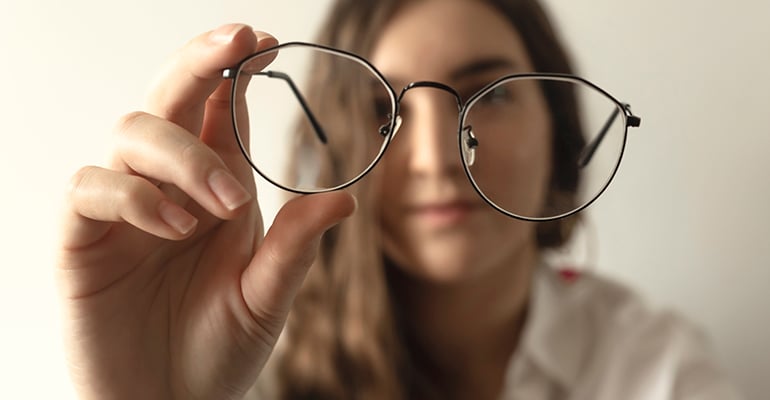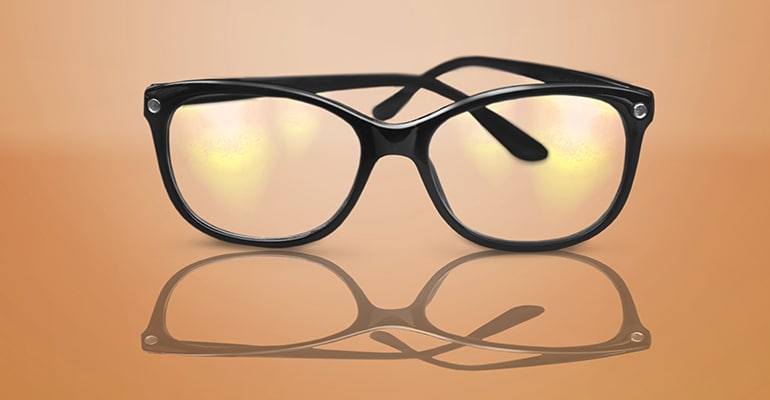How Should the Person with High Myopia Choose the Right Glasses?
Mar 05, 2023
How should the Person with High Myopia Choose the Right Glasses?
Generally speaking, the lenses are thick due to the high diopters of myopia. However, if the lenses are too thick for a long time, the nose will become sore and the eyes will not be comfortable. So, how should people with high myopia choose glasses to be comfortable, correct their myopia, and relieve eye fatigue?
What is "High Myopia"?
The so-called high myopia, that is, myopia with a severity of -6.00D (six hundred diopters) or even higher.
The most troublesome thing for people with high myopia when choosing glasses is the thick lenses, which not only affects their appearance but also makes them feel uncomfortable due to the heavy glasses' oppression on the bridge of the nose.
For this reason, individuals with high myopia painstakingly choose thinner lenses and lighter material frames, which can be costly.

What Kind of Frame should People with High Myopia Choose?
If people with high myopia want to choose comfortable glasses, they need to think about the size of the frame. The choice of frame size greatly affects the thickness of the lens.
We have an important parameter when fitting glasses: pupillary distance. The key to selecting the frame size is to choose a size to the pupillary distance as close as possible for comfort.
For example, if a person with high myopia of -8.00D (800 diopters) has a pupil distance of 65mm, then a pair of frames with a size of 75mm is selected, the glasses will appear very thick, whereas if a frame with a size of 68mm is chosen, they will be much thinner.
Under normal circumstances, the distance between our pupils is smaller than the horizontal distance of the optical center of the frame. In terms of the same refractive index, the smaller the difference between the two, the thinner the outer edge of the lens will be ground.

In the same way, when selecting the frame for high myopia, in addition to choosing the frame with a smaller horizontal distance from the optical center, you can also consider the a small frame with a height above and below the rim, so that the overall result will be thinner.
In short, the distance between the left and right sides and the upper and lower sides of the frame is narrower, which can reduce the thickness of lenses to a certain extent.
One more tip here is to adjust the visuals. In terms of the same pair of high-strength glasses, the wider the width of the frame, the more of the lens is covered, and the thinner it appears visually.
What should You Pay Attention to When Choosing a Frame?
1. Pay attention to the comfort of the frame:
Given that nearsighted people wear glasses for a long time, so it is important to choose a comfortable frame. Try frames made of different materials, such as plastic, metal, or a combination.
2. Choose the right frame for yourself:
The frame of glasses should suit your face shape, otherwise it may affect the visual effect.
How should People with High Myopia Choose Lenses?
1. Choose the right diopters:
The higher the diopters of myopia, the higher the diopters of glasses should be. Generally speaking, when the diopters of myopia is more than 200 diopters, it is necessary to choose thicker lenses to use.
2. Consider the anti-glare function of the lens:
During outdoor activities, the eyes can be subjected to strong light stimulation, so it is recommended to choose anti-glare lenses which can reduce eye irritation and protect eye health.
In general, when choosing glasses, you should consider factors such as your vision, comfort, and anti-glare function. It is advisable for you to consult an optometrist.

3. It is advisable to try to choose smaller frames:
Large frames not only increase the thickness around the lenses, but also increase the weight of the lenses. Small eyeglasses are best for people with high myopia, and rimless frames should be avoided, as they expose all the thickest parts around the glasses, making them appear visually thicker.
4. Aspheric lenses should be selected first:
In terms of the same refractive index, they are thinner than spherical lenses, lighter in weight, have less optical deformation, minimal edge aberrations, and provide clearer and more natural vision.
5. Don’t pursue the best corrected vision:
High myopia and bad vision are difficult to correct, so wearing glasses with a low function of correction is appropriate in order to strive for some improvement in vision while maintaining comfort. So don’t pursue the best corrected vision.
6. Choose resin lenses with high refractive index within your tolerance range:
They are lighter, thinner, and not easy to break.